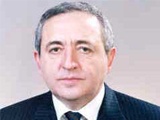Today.Az » Society » Not always an applicant with high scores in entrance exams is well prepared for further education: Azerbaijani senior education official
09 September 2009 [13:54] - Today.Az
Asaf Hajiyev, Corresponding Member of the Azerbaijan National Academy of Sciences, member of parliament’s education and science commission, spoke in an interview with Day.Az.
 Day.Az: The ‘Law on Education’ has been recently adopted. On what issues the commission is going to work now?
Day.Az: The ‘Law on Education’ has been recently adopted. On what issues the commission is going to work now?
Asaf Hajiyev: ‘Law on Education’ is a framework law which was passed by the parliament at the last session. This is kind of fundamental law of education on basis of which other special laws will be adopted.
At the autumn session, we will continue to work on separate laws on all levels of education, ‘On Higher Education’, ‘On Secondary Education’, ‘On Special Secondary Education’, etc.
A draft law ‘On Science’ will be submitted for parliamentary discussions.
Q: What most important items approved in the law will be implemented in near future?
A: An important point in the law is transition of secondary education to ‘9 +2; format. What is special about the innovation? The student completes the nine years, and if he/she has been a good student for these years, he/she continues to study 2 years more and then gets an opportunity to go to higher school.
But if he/she is not interested in education, there is no need to study grades 10 and 11. Such students may continue their education in secondary vocational schools and get a specialty. Nevertheless, such persons do not lose opportunity to enter universities. Successfully studying at secondary vocational schools at least for 3 years and sometimes 4 years, they are eligible for admission to universities.
Q: Will this novelty solve problems in secondary education?
A: The last two years of school will allow students to engage in a major they want. Two years of training will prepare students to meet modern requirements, on the other hand, to some extent it will replace tuition, which every year becomes more wide-spread in our country.
Tutoring is aimed at only entry to university, but our aim is to prepare qualified specialists. Unfortunately, not always an applicant who has received high scores at entrance exams is well prepared for education in higher schools.
Q: Which problems remain unsolved?
A: An important question which we must soon decide is to save our children from the stress they are experiencing at the end of the school. Within one month, they take both final and entrance exams. I have no recipe for how to resolve this issue yet.
Experience of developed countries would be helpful here. These countries mainly use final school examinations for admission to universities. This system is used in the United States and Western Europe. Turning to the system 9 +2will enable to easily solve this issue.
Q: Will the 'Law on Science' be passed at the autumn session of parliament?
A: The work is underway on the bill. I hope it will be brought up for discussions soon.
It will include social protection of scientists, defining functions of the Academy of Sciences, the funding of science, etc.
Today there is a need to invest more in science and education. The United States invests in science most of all – about $10 billion a year. We need to understand how to intelligently distribute the funds allocated and to what areas of science the state should pay special attention.
/Day.Az/
|
|